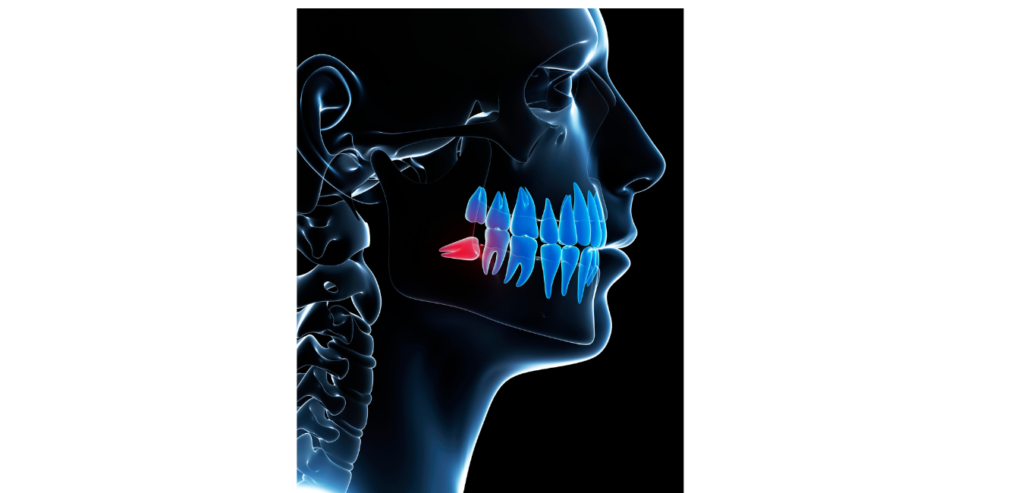Wisdom Teeth, Things You Should Know About Wisdom Teeth
A wisdom tooth is a molar (back tooth) that erupts in the last, usually during late adolescence or early adulthood. Any of the four third molars found in the permanent dentition (adult teeth) is known as a wisdom tooth.
Wisdom teeth are located at the very back of the dental arch. Some people may never develop their third molars, even if the majority of people have wisdom teeth. Additionally, a person may have more than four wisdom teeth.

If a wisdom tooth becomes impacted (doesn't typically emerge through the gums) under the gingival tissue, it is difficult to see. Occasionally, wisdom teeth can grow without any problems, but others may have problems and need to be removed.
Why do we have wisdom teeth?
According to one belief, wisdom teeth evolved because our ancestors ate rough foods such as roots, nuts, and meats, which required intense chewing power. Since our diets today consist of softer foods, evolutionary biologists have classified wisdom teeth as functionless due to evolution. You do not have to be an anthropologist to know that those teeth have outlived their purpose.
When do wisdom teeth grow?
Wisdom teeth, or third molars, represent the final stage in the development of your child's teeth. Some patients will experience this stage as early as 14 or 15; however, most will not experience it until they're in their twenties. Wisdom teeth generally start erupting between 17 and 25. Wisdom teeth can sometimes emerge naturally and line up with the teeth behind the second molars without any problems. In many cases, however, third molars cannot develop normally because the mouth is too crowded.
Are wisdom teeth always bad for you?
Often, wisdom teeth that do not break through (also known as "impacted" wisdom teeth) usually do not cause any problems. Occasionally, however, impacted wisdom teeth may cause problems that are not immediately apparent. They can also be hard to clean, so that they may be more vulnerable to tooth decay and gum diseases. You can have a lot of problems with wisdom teeth that do break through.
Symptoms of wisdom tooth eruption:
You may experience a stab of sharp pain from time to time, but it is usually mild. Furthermore, chewing with the molars near where your wisdom teeth are about to erupt can be painful or uncomfortable.
These symptoms are usually the result of impacted wisdom teeth, which means they're stuck under the gum line or don't have enough space for emerging fully.
Damage to nearby teeth and the jawbone occurs when wisdom teeth are impacted.
You might experience a low-grade fever if your wisdom teeth are erupting. Over the area of the emerging tooth, you may also see a small flap of gum, known as a pericoronal flap.
Here are some common signs that your wisdom teeth are about to breakthrough:
- a bad taste in your mouth
- bleeding or tender gums
- Inflammation of the gums behind the second molars
- bad breath
- difficulty opening your mouth wide
- wisdomtooth can case pain in the jaw
- Red or swollen gums.
Diagnosis:
Dental Examination: By having your teeth and mouth evaluated by a dentist or oral surgeon, you can determine whether you have impacted wisdom teeth or if some other condition is responsible for your problems.
Dental X-ray: You may notice the presence of wisdom teeth through a dental X-ray. One of the best ways to find out if your wisdomteeth will come in soon is to take a panoramic X-ray, which reveals an image of your entire mouth. The use of dental X-rays can reveal impacted teeth and signs of tooth or bone damage.
Other imaging techniques: This can be done to rule out other conditions if your dentist deems it necessary.
Without the above diagnosis, you may know your wisdomteeth are coming in because you will start to notice some unpleasant symptoms.
Complications:
Some of the common complications of wisdom teeth are as follows:
| complication | explanation |
| Damage to other teeth | When the wisdom tooth rubs against the second molar, the second molar may be damaged or infected. In addition to crowding other teeth, this pressure can also force them to need orthodontic treatment to straighten. |
| Formation of cysts | Wisdom teeth emerge from a sac within the jawbone. Upon filling with fluid, the sac can grow into a cyst that can damage the jawbone, teeth, and nerves. Rarely, a tumor develops, usually not cancerous (benign). Bones and tissue may have to be removed due to this complication. |
| Teeth Decay | Partially impacted wisdom teeth are at greater risk of decay (caries). Food and bacteria may get trapped between a partially erupted tooth and the gums because wisdom teeth are harder to clean. |
| Gum disease | Pericoronitis is a painful, inflammatory gum condition that occurs when impacted, partially erupted wisdom teeth are not cleaned properly. |
Treatment:
Depending upon the severity of pain and the extent of damage caused by the eruption of the wisdomtooth you can take one of the following routes to deal with your condition:

Home Remedies: for Wisdom Teeth pain
Some of the common home remedies include:
- Ice packs: The application of an ice pack to the jaw can relieve pain by reducing inflammation. The use of ice can also have a numbing effect.
- Rinsing with salt water: Due to the natural disinfectant properties present in the saltwater, it can help prevent the complications that are produced with the eruption of wisdom teeth. According to a study rinsing the mouth with salt water can help reduce bacteria, so it would be great to use as it prevents the worsening of the condition.
- Teabags: According to some studies, it was found that tannins (present in tea bags have anti-inflammatory and antibacterial properties. This shows that tea bags may help reduce swelling and fight bacterial infections.
- Onions: According to some studies, it was found that onions have antimicrobial and anti-inflammatory properties. The advantages of onions include reducing swelling and preventing bacterial infections.
- Cloves: Studies suggest that cloves can relieve wisdom tooth pain. Research showed that there is a promise for cloves as a topical pain reliever due to their numbing effect.

Medical Treatment:
- NSAIDs (nonsteroidal anti-inflammatory drugs): NSAIDs such as Ibuprofen are readily available over the counter (OTC); these medications play their role by reducing inflammation, thus relieving any pain produced as a result of that inflammatory reaction.
- Numbing gel: A numbing dental gel (gels that are readily available OTC) may help reduce the severity of the pain and feeling in the gums. The active ingredient of these gels is benzocaine.
Surgical extraction of Wisdom Teeth
You'll usually go home the same day after the extraction because it's usually an outpatient procedure. First, your mouth will be numbed with anesthesia which may be of three types
- Local anesthesia
- Sedation anesthesia
- General anesthetic
After anesthesia, your dental or oral surgeon makes an incision in your gums and removes any bone that blocks your tooth's root from being reached. In most cases, the dentist or oral surgeon stitches the wound after removing the tooth and packs the empty cavity with gauze.
There may be some pain and bleeding after wisdomtooth extractions, as well as swelling at the extraction site or in the jaw. Due to swelling of the jaw muscles, some people find it difficult to open their mouth wide temporarily. In addition to pain and swelling management instructions, you will receive instructions on how to care for wounds and use cold compresses to reduce swelling.
In rare cases, there may occur some surgical complications:
- dry socket occurs when the blood clot disappears from the tooth socket or if it becomes dislodged from its original location.
- nerve injury numbness or tingling may result from such an injury, which may be temporary or permanent.
- infection This is characterized by swelling and pain at the extraction site as well as a temperature over 100° F
- bleeding If you experience pain or bleeding after having your wisdomteeth removed, contact your dentist.
When to see your dentist:
See your dentist immediately if you feel that home remedies and medication are not working. You should also schedule regular dental appointments so your dentist will be able to better deal with your condition before it gets worse.
You should also visit your dentist if you experience the symptoms such as dry socket, infection, and bleeding that are somewhat common after the extraction of a wisdom tooth.
FAQs: About Wisdom Teeth
After wisdom teeth extraction, how long should I rest?
Three to four days are typically required for most people to fully recover from wisdomtooth surgery. An impacted tooth or one that came in at an awkward angle could take a full week to heal. The wound left behind as a result of the surgical extraction of the tooth won't be healed completely for weeks or even for months, so you can still develop an infection weeks after surgery.
What is the recommended number of wisdomteeth to be removed?
If the patient chooses, they can usually have all four of their wisdom teeth removed at once. Ask your oral surgeon about your preferences and any questions you may have about the treatment.
What type of anesthesia will I receive?
For simple tooth extractions, lidocaine is usually used as the local anesthesia. Nitrous Oxide (Commonly known as laughing gas) is mixed with oxygen and administered through a nasal apparatus. Patients typically remain conscious throughout the procedure.
What is your expectation of the complexity of the procedure?
While it's a more complicated procedure than getting a filling or braces, it still carries the risk of developing several complications. Having said that, wisdomteeth removal is a common dental milestone nowadays, and the associated complications have reduced drastically over the last decade.
Approximately how long does wisdom tooth extraction take?
The average wisdomtooth extraction procedure lasts about 45 minutes. You won't feel any pain during the tooth extraction as you will be under the influence of anesthesia. There might be a choice between general sedation, oral sedation, or IV sedation.
Does the impacted wisdom tooth cause damage to the other teeth?
Pain, tooth damage, and other dental problems can result from impacted wisdom teeth. Wisdom teeth can become impacted without causing problems immediately. Nonetheless, they may be more susceptible to tooth decay and gum disease than other teeth due to their difficult cleaning.
Can I experience nerve damage during tooth extraction?
When a tooth is extracted, there is a risk of nerve damage, whether it is a normal adult tooth or a wisdomtooth. Tooth extraction can damage the trigeminal nerve, causing pain, tingling, and numbness in your lower lip, chin, tongue, teeth, and gums.



